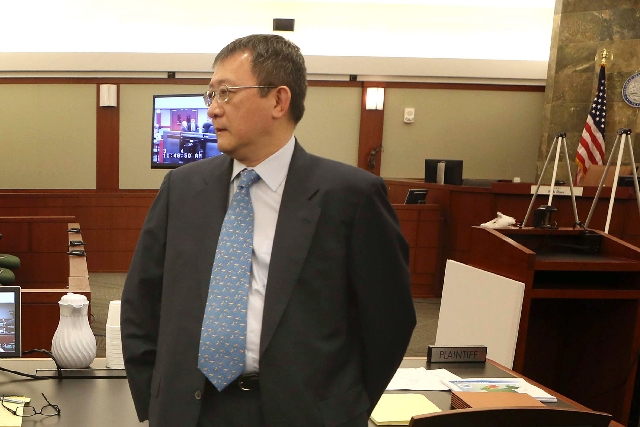Sands’ lawyers try to emphasize scant evidence of Suen contribution to Macau entry
The Las Vegas Sands Corp. legal team spent much of Thursday highlighting the scant hard evidence that one-time consultant Richard Suen contributed to the company’s entry into Macau but did encounter a judicial brushback at one point.
Attorney Richard Sauber posed repeated questions to Suen about why Suen’s associate and longtime friend Zhu Shensheng did not appear as a witness. Suen credits Zhu with accomplishing a large share of the work for Sands, including arranging a Beijing meeting with top central government officials.
Eventually, Suen attorney John O’Malley objected to the questions as “rehash and rehash. If the witnesses aren’t here, they’re not here. If they’re here, they’re here.”
At that point, Clark County District Judge Rob Bare ruled, “I do agree with (O’Malley) on the whole issue of Mr. Zhu not being in attendance. My guess is that every one of these jury members fully understands that he is not going to be here and has a pretty good understanding of why that is not going to be. Let’s move on.”
“With all due respect, sir, I disagree there’s any understanding of why he’s not here other than this third-hand account,” Sauber replied to Bare.
“It’s what it is,” Bare countered. “I mean, if you want to get into it with me, we can do that.”
Sauber then changed the subject.
Suen testified that Zhu declined to appear due to pressure from unidentified government officials. As a retired Chinese military officer and railroad ministry official, his pension, medical care and housing all come from the government.
“He’s been told not to come, so he is unwilling to come,” Suen said.
Sauber was also rebuffed when he attempted to question Suen about a published remark about the case coming from Chinese officials. According to an April 8 report by Reuters, China’s foreign ministry issued a statement that read, “The process (of selecting gaming concessions for Macau in 2002) was carried out by the special administrative region’s government (Macau) by themselves on the principals of openness and transparency in accordance with the law.”
O’Malley dismissed the statement as “self-serving” by officials who were not there.
Macau’s three gaming concessions were awarded after the region’s government conducted a public bidding process that attracted international entrants. But the July 2001 meeting in Beijing that lasted 40 minutes and included top Sands executives and then-Chinese vice premier Qian Qichen, who had responsibility for Macau, is the linchpin to Suen’s claim that Sands owes him $328 million for his work.
Suen claims that the meeting got Sands “90 percent of the way” to winning what has become its lucrative Macau foothold.
Sauber pointed to the section of China’s Basic Law that grants the former Portuguese colony autonomy from Beijing to conduct internal affairs, including gaming policy. Suen, however, contends that the Beijing meeting persuaded Chinese officials to support Sands and then communicate their preference to Edmund Ho, then Macau’s chief executive.
Sauber questioned Suen at length about what direct knowledge he had of Beijing’s sway in the matter, either written or personally talking with key officials. Suen acknowledged that he had nothing.
Instead, Suen said he relied on “a whole series of circumstantial evidence” to back his stance. Included in the incidents was Ho’s switch from his initial preference for a small casino hotel to a large one that Suen said Qian liked after Ho traveled to Beijing after the July 2001 meeting. In addition, Macau government officials, including Ho, intervened twice to adjust the Sands bid in 2002 after it appeared to falter.
In a follow-up, Suen attorneys raised two instances where Ho acknowledged the Beijing meeting, albeit indirectly.
While the Basic Law enshrined the principal of autonomy for Macau, Suen testified that the final authority, including the ability to appoint the chief executive, rested in Beijing.
Suen’s cross-examination concluded Thursday, but questions from the jurors begin this morning.
Contact reporter Tim O’Reiley at
toreiley@reviewjournal.com or 702-387-5290.

















